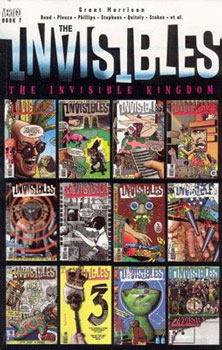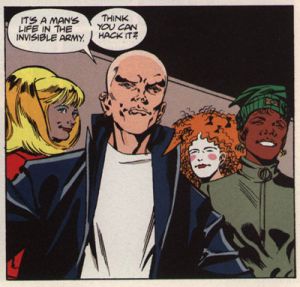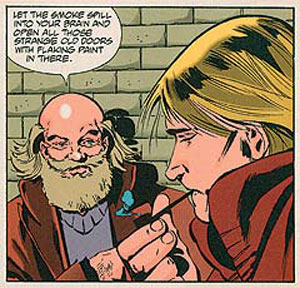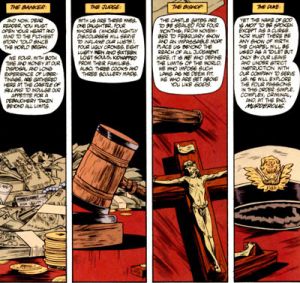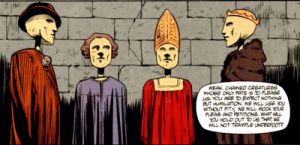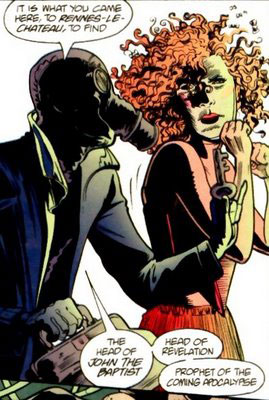Comics /
Spotlight /
Religion and Comics
Say You Want a Revelation
By Beth Davies-Stofka
March 25, 2010 - 18:46
Grant Morrison's
The Invisibles, published by DC/Vertigo between 1994 and 2000, and then collected into seven trade paperbacks, is about a group of freedom fighters who confront a sinister consortium called "The Outer Church," bent on enslaving humans on behalf of alien masters (at least, we think that's what's going on). The Invisibles use unconventional methods like time travel, psychedelic drugs, telepathy, divination, linguistics, and sorcery.
They also use martial arts and guns, although by the end of the series, they have learned nonviolent methods that are more effective.
At the very beginning of the series, the Invisibles recruit a young thug named Dane McGowan from the streets of Liverpool, and teach and nurture him as a messiah. At the end of the series, Dane saves the human race from catastrophe and slavery, and ushers in the new age.
Reception of
The Invisibles, particularly the last 12 issues, was often quite dramatic. Some readers claimed their heads had exploded, while others claimed that their powers as magicians had improved and that they were having the best sex of their lives. Readers seemed to agree that conceptually,
The Invisibles was one of the most intricate and complex comics they had read.
What can account for these exalted claims about the effects of this comic series? I think the key lies in Morrison's unexpected use of an ancient genre.
The Invisibles resembles the Judeo-Christian apocalyptic literature that developed alongside scripture between the third century BCE (Before the Common Era, or "Before Christ" if you're into that), and the first century CE (Common Era, or AD if you're into that).
But Morrison turns ancient apocalyptic conventions inside out.
The word apocalypse means "revelation," a set of revealed truths delivered by supernatural means. Apocalyptic literature divides history into set periods, and illustrates the idea of a new creation coming to replace the present order. Apocalyptic literature contains allegorical visions and otherworldly journeys by which the reader is taken on a tour to the very ends of the universe. The reader is warned of a coming judgment.
The Invisibles adopts all these aspects of apocalyptic literature, yet Morrison sheds the normally ominous Judeo-Christian warnings in favor of a radical vision of a new creation in which there is no death and no judgment. In Morrison's revelation, everyone is delivered from the burdens of ancient religions, rules, and laws, and everyone lives.
The Christian New Testament's
Apocalypse of John (more commonly known as
Revelations) is easily the most well-known work of apocalyptic literature from the ancient world. It was written in about 90 CE by a Christian leader named John who had been exiled to the island of Patmos. John describes several visions that warn about the coming end times, launched by a heavenly battle between the armies of heaven and the kings and armies of earth. After the victory of the armies of heaven, the dead are resurrected and judged, some thrown into the lake of fire for what they had done. Everyone else goes to live in the glittering city of New Jerusalem, which is lit by the glory of God and watered by the river of life.
Many Christians accept John's apocalypse as God's word, and find ways to live their lives according to its admonitions and predictions. Meanwhile, from pulpits and cable television, we hear warnings of coming tribulations. Pop culture preachers aggressively condemn so-called idolaters, black magic practitioners, and the "sexually immoral," all supposed enemies of God, described by
Revelations as shameful and deceitful people.
In other words, from the standpoint of preachers and scriptures, the enemies of God are, well, the Invisibles!
Morrison's Invisibles have no fear or shame about sex or magic. The powerful sorcerer Lord Fanny is a beloved Brazilian transvestite. It is part of teenager Dane McGowan's maturation to overcome his prejudices and bond with her.
The Marquis de Sade is recruited to develop a program of sexual revolution by implementing the ideas of Wilhelm Reich, inventor of the orgone accumulator. A cell of Invisibles led by the lesbian Jolly Roger steals the AIDS vaccine from a secret US Government facility, and goes on to play an essential role in saving humanity from enslavement to aliens from another universe. Transvestites, lesbians, libertines, and lovers of all varieties are the heroes of Morrison's story.
In their struggles to comprehend the coming new age and their place in it, the Invisibles employ tarot, telepathy, psychic projections and other magical tools. The Bible's
Revelations might make us think we should condemn Morrison's heroes. But Jesus, the Buddha, and the Hindu gods Kali and Ganesha all play their part in helping them.
Morrison's apocalypse converts the sinners of John's apocalypse into heroes. And vice versa! In addition, the apocalypse of
The Invisibles is the antithesis of John's apocalypse. The heavenly battle, the resurrection and judgment of the dead, and cosmic transformation are also central to Morrison's story, but he uses them to propose an idea far different than John's. John's apocalypse is about the triumph of good over evil. Morrison's apocalypse is about the marriage of good and evil, as well as all opposites.
In John's apocalypse, a blood-drenched army from heaven fights and destroys the armies of the kings and the Beast. In Morrison's apocalypse, a loving and nurturing Goddess-figure speaks to us on the eve of our liberation from ignorance, saying, "I love you."
In John's apocalypse, the dead are resurrected and judged according to their deeds. Those who are condemned are tossed away into a lake of fire. In Morrison's apocalypse, no one dies, and there is no judgment. At the end, as the new age is ushered in by young people dancing furiously to the techno drums implanted in their shoes, Dane tells us:
We made Gods and jailers because we felt small and ashamed and alone. We let them try us and judge us and, like sheep to slaughter, we allowed ourselves to be…sentenced.
See! Now! OUR SENTENCE IS UP.
For some faithful Christians, John's apocalypse provides a foundation for belief and morality. The thing is Grant Morrison hopes no less for his apocalyptic vision. He has said that he wants the entire series to serve as a kind of "hypersigil," a magical meme that could nurture the liberated consciousness he describes. In his view, the priests and the prophets have jailed the minds of men with a redemptive vision for the few. In Morrison's new age, the cosmic transformation is for all.
Rating: 9 /10
Last Updated: January 17, 2025 - 08:20
